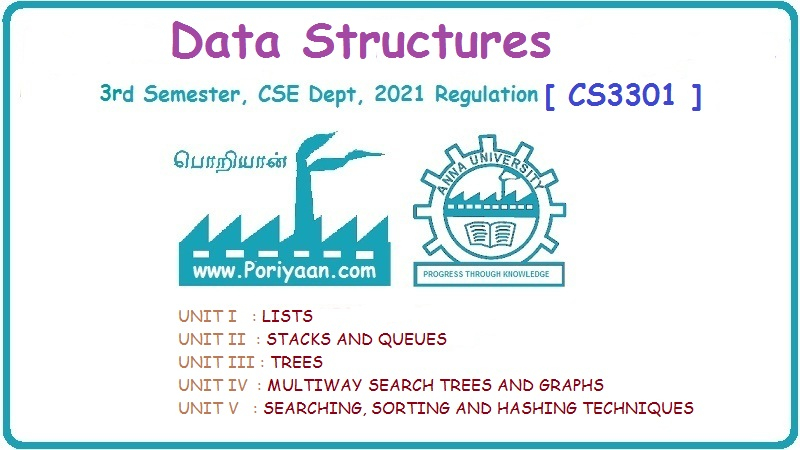Data Structure: Unit II (b): Queue
Queue Operations
with Example C Programs | ADT Data Structure
Queue is nothing but the collection of items. Both the ends of the queue are having their own functionality.The Queue is also called as FIFO i.e. a First In First Out data structure.
Queue Operations
• Queue
is nothing but the collection of items. Both the ends of the queue are having
their own functionality.
• The
Queue is also called as FIFO i.e. a First In First Out data structure.
• All
the elements in the queue are stored sequentially.
• Various operations on the queue are
1. Queue
overflow.
2. Insertion
of the element into the queue.
3. Queue
underflow.
4.Deletion
of the element from the queue.
5.
Display of the queue.
Let us
see each operation one by one
'C' representation
of queue.
struct
queue
{
int que
[size];
int
front;
int
rear;
} Q;
1. Insertion of element into the queue
The
insertion of any element in the queue will always take place from the rear end.

Before performing insert operation you must
check whether the queue is full or not. If the rear pointer is going beyond the maximum size of the
queue then the queue overflow Occurs.

2. Deletion of element from the queue
The
deletion of any element in the queue takes place by the front end always.

Before performing any delete operation one must
check whether the queue is empty
or not. If the queue is empty, you cannot perform the deletion. The result
of illegal attempt to delete an element from the empty queue is called the
queue underflow condition.

Let us
see the `C`mplementation of queue.
Ex. 3.3.1 Implementation of queue using arrays.
/******************************************
Program
for implementing the Queue using arrays
*******************************************
#include<stdio.h>
#include<stdlib.h>
#include<conio.h>
#define
size 5
struct
queue
{
int
que[size];
int
front,rear;
}Q;
/*
The
Qfull Function
Input:none
Output:1
or 0 for q full or not
Called
By:main
*/
Qfull()
{
if(Q.rear
>=size-1)
return
1;
Note: If Queue exceeds the
maximum size of the array then it returns 1 - means queue full is true
otherwise 0 means queue full is false
else
return
0;
}
/*
The
insert Function
Input:item
which is to be inserted in the Q
Output:rear
value
Called
By:main
Calls:none
*/
int
insert(int item)
{
if(Q.front
== -1)
Q.front++;
Q.que[++Q.rear]
= item;
Note:This condition will occur
initially when queue is empty when single element will be present then both
front and rear points to the same
return
Q.rear;
}
int
Qempty()
{
if((Q.front
== -1) || (Q.front > Q.rear))
return
1;
else
return
0;
}
/*
The
delet Function
Input:none
Output:front
value
Called
By:main
Calls:none
*/
int
delet()
{
int
item;
item = Q.que[Q.front];
Q.front++;
printf("\n
The deleted item is %d",item);
return
Q.front;
}
/*
The
display Function
Input:none
Output:none
Called
By:main
Calls:none
*/
void
display()
{
int i;
for(i=Q.front;i<=Q.rear;i++)
printf("%d",Q.que[i]);
}
void
main(void)
.{
int
choice,item;
char
ans;
clrscr();
Q.front
= -1;
Q.rear =
-1;
do
{
printf("\n
Main Menu");
printf("\n1.Insert\n2.Delete\n3.Display");
printf("\n
Enter Your Choice");
scanf("%d",
&choice);
switch(choice)
{
case
1:if(Qfull()) //checking for Queue overflow
printf("\n
Can not insert the element");
else
{
printf("\n
Enter The number to be inserted");
scanf("%d",&item);
insert(item);
}
break;
case
2:if(Qempty())
printf("\n
Queue Underflow!!");
else
delet();
break;
case
3:if(Qempty())
printf("\nQueue
Is Empty!");
else
display();
break;
default:printf("\n
Wrong choice!");
break;
}
printf("\n
Do You Want to continue?");
ans =
getche();
}
while(ans == 'Y' || ans =='y');
}
/**********************
End Of Program ***********************
Output
Main
Menu
1.
Insert
2.
Delete
3.
Display
Enter
Your Choice 1
Enter
The number to be inserted 10
Do You
Want to continue?y
Main
Menu
1.
Insert
2.
Delete
3.
Display
Enter
Your Choice 1
Enter
The number to be inserted 20
Do You
Want to continue?y
Main
Menu
1.
Insert
2.
Delete
3.
Display
Enter
Your Choice 3
10 20
Do You
Want to continue?y
Main
Menu
1.
Insert
2.
Delete
3.
Display
Enter
Your Choice 2
The
deleted item is 10
Do You
Want to continue?y
Main
Menu
1.
Insert
2.
Delete
3.
Display
Enter
Your Choice 3
20
Do You
Want to continue?n
Key Point Always check queue full
before insert operation and queue empty before delete operation.
Ex. 3.3.2: Write a C program to implement queue
functions using Arrays and Macros.
Solution :
#include<stdio.h>
#include<stdlib.h>
#include<conio.h>
/* Macro definitions */
#define
size 5
#define
Isfull Q.rear >=size-1
#define
Isempty (Q.front == -1) || (Q.front > Q.rear)
struct
queue
{
int
que[size]; //Queue using Arrays
int
front,rear;
}Q;
Qfull()
{
if(Isfull)
return
1;
else
return
0;
}
int
insert(int item)
{
if(Q.front==-1)
Q.front++;
Q.que[++Q.rear]
= item;
return
Q.rear;
}
int
Qempty()
{
if(Isempty)
return
1;
else
return
0;
}
int
delet()
{
int
item;
item =
Q.que[Q.front];
Q.front++;
printf("\n
The deleted item is %d",item);
return
Q.front;
}
void
display()
{
int i;
for(i=Q.front;i<=Q.rear;i++)
printf("%d",Q.que[i]);
}
void
main(void)
{
int
choice,item;
char
ans;
Q.front
= -1;
Q.rear =
-1;
do
{
printf("\n
Main Menu");
printf("\n1.Insert\n2.Delete\n3.Display");
printf("\n
Enter Your Choice");
scanf("%d",
&choice);
switch(choice)
{
case
1:if(Qfull()) //checking for Queue overflow
printf("\n
Can not insert the element");
else
{
printf("\n
Enter The number to be inserted");
scanf("%d",
&item);
insert(item);
}
break;
case
2:if(Qempty())
printf("\n
Queue Underflow!!");
else
delet();
break;
case
3:if(Qempty())
printf("\nQueue
Is Empty!");
else
display();
break;
default:printf("\n
Wrong choice!");
break;
}
printf("\n
Do You Want to continue?");
ans =
getche();
}
while(ans =='Y' || ans =='y');
}
Review Question
Data Structure: Unit II (b): Queue : Tag: : with Example C Programs | ADT Data Structure - Queue Operations
Related Topics
Related Subjects
Data Structure
CS3301 3rd Semester CSE Dept | 2021 Regulation | 3rd Semester CSE Dept 2021 Regulation
